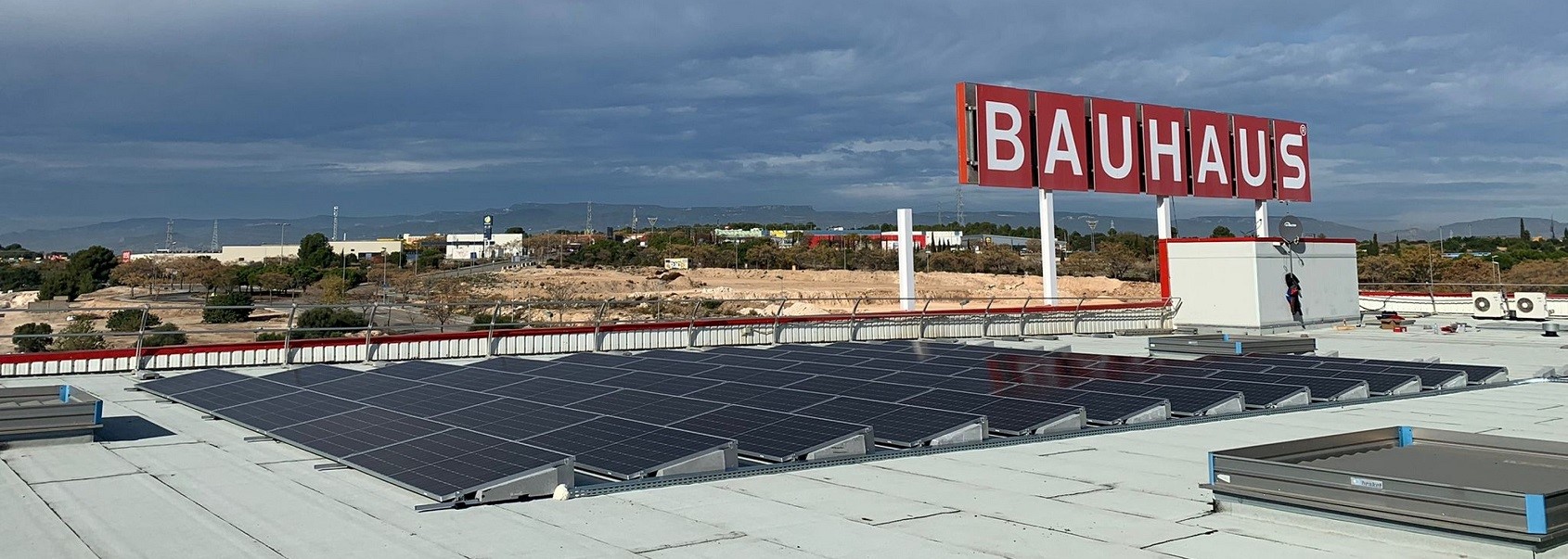
BAUHAUS relies on EDP to set up seven photovoltaic plants in its Spanish stores

BAUHAUS will obtain more than 2 MWp of contracted power, thus avoiding the yearly emission of more than 720 tons of CO2 to the atmosphere and achieving 27% energy savings
BAUHAUS, a referential brand in home improvement, remodelling, interior design and gardening, and EDP, world leader in renewable energy, have come together to push self-consumption forward through the implementation of photovoltaic energy projects that amount to 2 MWp and 3,330 photovoltaic panels in BAUHAUS stores located in Spain. The agreement includes seven facilities, five of which are already operating, located in the Valencian Community, Madrid, Catalonia and the Balearic Islands. This commitment to the future will allow BAUHAUS to produce 100% renewable energy while also achieving 27% energy savings. The estimated yearly production is of almost 2,170 MWh/year, which translates into the average yearly electricity consumption of more than 570 homes.
The first working facility, located in Alcorcón (Madrid), has 313.92 kWp of power and is composed of 576 photovoltaic panels. The estimated yearly production will be of 394.20 MWh/year, and it will prevent the emission of 129 tons of CO2 a year, a positive impact similar to that of 10,000 new trees.
The second operational facility is located in Paterna (Valencia). It consists of 6888 solar panels, has 374.96 kWp of power and its estimated yearly production will be of 437.40 MWh/year. Self-consumption through this plant will prevent the emission of 144 tons of CO2 a year, or an impact not unlike that of 10,800 new trees.
The third already operational facility is located in the store in Gavá (Barcelona), with 156.96 kWp of power and 288 solar panels. Its yearly production will be of 162.90 MWh/year, which means a reduction of yearly emissions of 54 tons of CO2, the same as the positive impact of 4,050 new trees.
The store in Tarragona, also in operation, has 186.39 kWp and its yearly production will be of 214.20 MWh/year. It is equipped with 342 solar panels and will prevent the yearly emission of 70 tons of CO2 to the atmosphere, that is, a positive impact similar to that of 5,250 new trees.
The fifth facility is in Marratxi (Mallorca), in operation since last January. It has 274.68 kWp of power, 504 solar panels and can produce 309.60 MWh a year, thus preventing the yearly emission of 102 tons of CO2, a positive impact like that of 7,650 new trees.
There is also a facility underway at the Leganés store (Madrid), which has 360 kWp of power, 655 solar panels and whose annual production will reach around 500 MWh/year, which means a reduction in the annual emission of 167 tons of CO₂, equivalent to the positive impact that would be generated by planting 12,525 trees.
The last facility is in Mas Gri (Girona), it has 151 kWp of power and its yearly production will be of more than 150 MWh/year. It consists of 277 solar panels and will prevent the emission of 167 tons of CO2 a year, equal to the positive impact of 4,275 new trees.
These seven facilities strengthen BAUHAUS' commitment to environmental protection. Fernando Aguilera, the company’s head of expansion, construction works and facility manager, emphasizes that this commitment seeks “new ways to generate energy savings, reduce the carbon footprint and promote sustainability and efficiency in stores.” Aguilera also indicates that, in the case of BAUHAUS Girona, located in the Mas Gri shopping park, the installation process is expected to start this month. Furthermore, he adds that “This collaboration raises awareness about the effects of climate change and the practices needed to take care of our planet, with a view to future generations.”
Carles Ureta, cluster manager for industrial processes in Spain, sees this project with BAUHAUS as a success story that “reflects the close relationship with our business clients, as well as our ability to continue innovating and developing comprehensive projects that contribute to boosting energy savings, sustainability and competitiveness for our clients, who benefit from all the advantages offered by self-consumption from day one”.
Both companies have been collaborating since 2021, selling photovoltaic installations in eleven of the German company's stores in Spain. This is a way to boost self-consumption, as well as to promote energy saving, efficiency, sustainability and to bring solar energy closer to people in a simple, personalized and economical way.